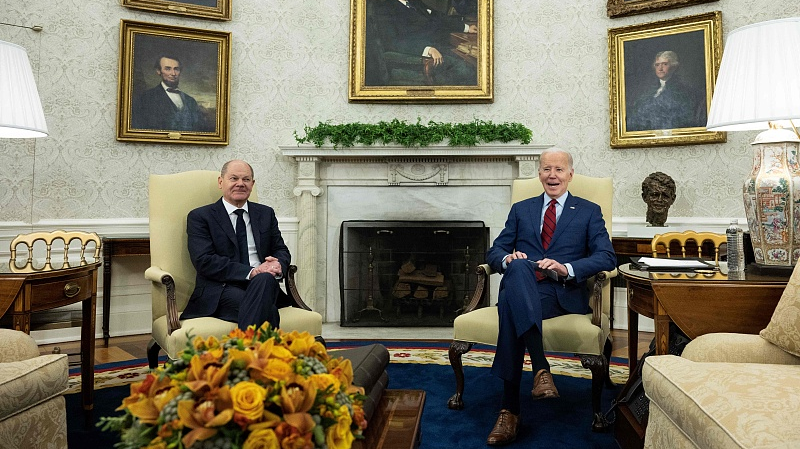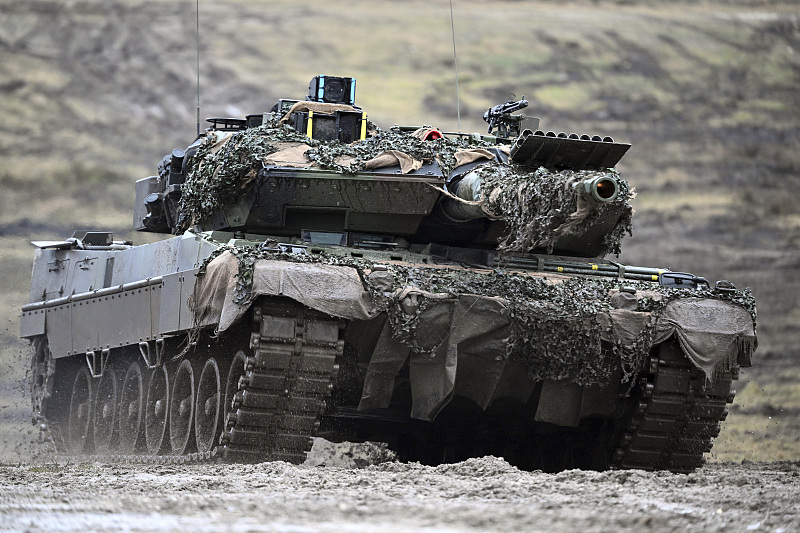
U.S. President Joe Biden meets with German Chancellor Olaf Scholz in the Oval Office of the White House in Washington, D.C., March 3, 2023. /CFP
By Zheng Chunrong
Editor's note: Zheng Chunrong is director of the German Studies Center of the Tongji University in Shanghai.
On March 3, German Chancellor Olaf Scholz made a "lightning" working visit to the U.S. White House. This was his second visit to the White House since taking office, the last one was on February 7, 2022, when the subject of talks was the situation in Ukraine. This visit came around the first anniversary of the outbreak of the Russia-Ukraine conflict, and it is clear that the coordination of the German and American positions on the response to the Russia-Ukraine conflict was the main topic.
Scholz's visit to the U.S. was both very brief and "secretive," with no journalists or economic delegations accompanying him and no press conference following the talks. At a media briefing before the talk, U.S. President Joe Biden thanked Germany for its "strong and steady leadership" in response to "Russia's war against Ukraine." Scholz responded with praise for the "very good cooperation" between Germany and the U.S. Both sides emphasized the "lockstep" on the war in Ukraine and their plans to continue current cooperation in supporting Ukraine.
It follows that, as a White House statement before Scholz's visit to the U.S. put it, the Chancellor's visit is "an opportunity to reaffirm the deep bonds of friendship between the United States and our NATO Ally Germany." However, behind the apparent harmony, there are many differences between both sides that cannot be concealed.
First of all, both sides need to overcome the disparity of pace on the issue of sending weapons to Ukraine. Jake Sullivan, Biden's national security adviser, once revealed that the U.S. had not planned to send Abrams tanks to Ukraine at first, on the grounds that the Ukrainian army could not immediately put them into service. According to him, the U.S. side later decided to send Abrams tanks due to "coalition solidarity" because the German side had made this as a prerequisite for sending Leopard 2 tanks by the German side.
But the German side denied a direct link between these deliveries. Scholz emphasized that Germany's decisions to send weapons are always made in close coordination with the U.S. and other allies. After Germany made the decision to send the Leopard 2 battle tanks, the U.S. side said it would delay the delivery of the Abrams tanks, which undoubtedly "hurt" the German side. Although Scholz and Biden did not mention the "tank fiasco" in their public statements during the visit, Scholz certainly expressed in private talks that the two sides would further strengthen the coordination of their positions on the aid to Ukraine in the future, so as not to expose their differences of opinion and even to shift the blame to each other.

Germany is delivering four more Leopard 2 main battle tanks from Bundeswehr stocks to Ukraine, February 1, 2023. /CFP
Second, both sides also have different views on their policies toward China. Recently, the U.S. side deliberately spread the disinformation that "China may supply weapons to Russia" and intended to find a pretext to impose sanctions on China together with its European allies. Germany is reluctant to get involved in the strategic competition between China and the U.S., even under constant U.S. solicitation and pressure. And Scholz has repeatedly expressed his opposition to "decoupling" from China, and emphasized instead the need for dialogue and cooperation with China on a wide range of issues. And to this end he has resisted pressure from the U.S. and the European Union, as well as within Germany.
Finally, Scholz also wants to do "persuasion" on the U.S. "Inflation Reduction Act" and its burden on Europe. The U.S. bill provides for huge investments in climate protection, but the subsidies and tax breaks are contingent on purchasing products from U.S. companies or producing them directly in the U.S.
This trade protectionist measure led to fears in Germany and other European countries of the exodus of European industrial enterprises to the U.S., ultimately leading to the "deindustrialization" of Europe. Therefore, the European side has been hoping the U.S. side to amend the relevant bill, or at least grant exceptions to European companies similar to those in Mexico and Canada. However, the U.S. side does not mean to give in to the European side.
Recently, after repeated unsuccessful negotiations between the European Union and the U.S., the European Commission launched the "The Green Deal Industrial Plan" and other initiatives, which contains specific response "tools" to the U.S. "Inflation Reduction Act." Therefore, Scholz's visit to the U.S. is also intended to negotiate with Biden on the issue of "green subsidies" to avoid increasing tensions in bilateral economic and trade relations. However, since several lobbying and protests of the European side have not been effective before, Scholz's visit this time was also destined to have no end on this issue.
In short, Scholz's visit to the U.S. showed the unity and close relationship between both sides and responded to the outside doubts about the contradictions between Germany and the U.S. on some issues.
However, this does not mean that the differences between both sides on many issues do not exist. Scholz's visit to the U.S. was so "secretive," which shows that there are many unsynchronized places between both sides, which need to be "digested in private." Since the end result is often detrimental to German interests, this digestion is "bitter" for Germany. In this regard, Germany needs to wake up to the situation.













